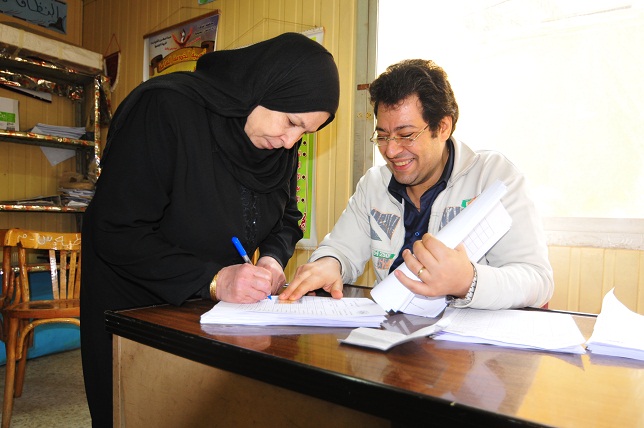CAIRO: Scores of Egyptian soccer fans were crushed to death while others were fatally stabbed or suffocated after being trapped in a long narrow corridor trying to flee rival fans armed with knives, clubs and stones, in the country’s worst ever soccer violence that killed at least 74 people, witnesses and health officials said Thursday.
The tragedy Wednesday evening — which followed an Egyptian league match between Al-Masry, the home team in the Mediterranean city of Port Said, and Al-Ahly, based in Cairo and one of Egypt’s most popular teams — was a bloody reminder of deteriorating security in the Arab world’s most populous country, as instability continues nearly a year after former President Hosni Mubarak was swept out of power in a popular uprising.
It was also the deadliest soccer violence worldwide since 1996. One player said it was "like a war."
Egyptian activists have accused the police and military of failing to intervene to stop the mayhem.
On Thursday morning, dozens of angry protesters sealed off Tahrir Square, the epicenter of the uprising that toppled Mubarak, while others blocked the street in front of the state TV building in downtown Cairo ahead of planned marches later in the day to the Interior Ministry to denounce the police force.
The melee at the stadium in Port Said erupted when Al-Masry fans stormed the field following a rare 3-1 win against Al-Ahly. Al-Masry supporters, armed with knives, sticks and stones, chased players and fans from the rival team, Al-Ahly, who ran toward the exits and up the stands to escape, according to witnesses.
Ahmed Ghaffar, one of the visiting Al Ahly fans at the stadium, said "layers of people" were stuck, "suffocating inside a narrow corridor" as they tried to get out of the stadium
"The people were stuck over each other because there was no other exist," Ghaffar tweeted on Thursday. "We were between two choices, either death coming from behind us, or the closed doors."
Ghaffar said that seconds after the match ended, Al-Masry fans rushed onto the pitch from all sides while the police stood by motionless. A power outage followed, he said, and "the soccer field fell into darkness."
"We were surprised the police let them in that easy. The numbers were huge," he said.
As many Al-Ahly fans crowded into the corridor leading out of the stadium, they were trapped, with the doors at the other end locked.
Ghaffar said Al-Masry fans beat Al-Ahly fans who fell on the floor and also described several stampedes.
Al-Masry fan, Mohammed Mosleh, posted his account on Facebook, saying he saw "thugs with weapons" on his side in the stadium where police presence was meager.
"This was unbelievable," he said. "We were supposed to be celebrating, not killing people. We defeated Al-Ahly, something I saw twice only in my lifetime. All the people were happy. Nobody expected this."
Health ministry official Hisham Sheha said deaths were caused by stabs by sharp tools, brain hemorrhage and concussions. "All those carried to hospitals were already dead bodies," Sheha told state-TV.
One man told state TV he heard gunshots in the stadium, while a lawmaker from Egypt’s powerful Muslim Brotherhood said the police didn’t prevent fans carrying knives from entering the stadium.
TV footage showed Al-Ahly players rushing for their locker room as fistfights broke out among the hundreds of fans swarming on to the field. Some men had to rescue a manager from the losing team as he was being beaten. Black-clothed police officers stood by, appearing overwhelmed.
The Interior Ministry said 74 people died, including one police officer, and 248 were injured, 14 of them police. A local health official initially said 1,000 people were injured and it was not clear how severely. Security forces arrested 47 people for involvement in the violence, the statement said.
State TV appealed to Egyptians to donate blood for the injured in Port Said, and the military sent two aircraft to evacuate serious cases to the capital, Cairo.
A number of political parties called on the Egyptian parliament to pass no-confidence vote against the government of Kamal el-Ganzouri, a Mubarak-era politician appointed by the much-criticized ruling military council. El-Ganzouri himself held an emergency cabinet meeting early Thursday.
Essam El-Erian, a Brotherhood lawmaker, said the military and police were complicit in the violence, accusing them of trying to show that emergency regulations giving security forces wide-ranging powers must be maintained.
"This tragedy is a result of intentional reluctance by the military and the police," he said.
The trigger for the violence, however, remains a mystery since most of the attackers were from the winning team.
April 6 group, which was among youth groups that led the anti-Mubarak uprising, accused the ruling military of collaboration in the violence.
"Is it logical that the force that managed to secure parliamentary elections in nine provinces can’t secure a soccer match where skirmishes among fans were expected," the group said in a statement Thursday.
The organized soccer fans known as Ultras have playing an important role in the anti-Mubarak uprising and rallies against the military rule. Their anti-police songs, peppered with curses, have quickly become viral and an expression of the hatred many Egyptians feel toward security forces that were accused of much of the abuse that was widespread under Mubarak’s regime.
In the eyes of political activists, the long enmity between Ultras and much-hated security forces under Mubarak and under the military rule explains why the police stepped aside in the face of deadly brawl.
In a statement signed by Ultras of Al-Ahly, the group said Thursday that the military council and former members of Mubarak’s regime were retaliating for the Ultras role in the revolution.
"They want to punish us and execute us for our participation in the revolution against suppression," it said, and vowed a "new war in defense of our revolution."




